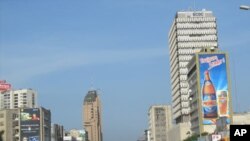"Everything the United States is doing in the Democratic Republic of Congo," said U.S. Ambassador James Entwistle, "is designed to help ensure that what happened in and to that country in the late '90s and the early 2000s, statistically the worst war since World War II, is to make sure that it never happens again and to help them recover from it." Part of that process includes holding successful elections, which are scheduled for late November.
The United States believes that the Democratic Republic of Congo, or DRC, is fully capable of conducting and certifying its vote and is focusing its assistance in the run-up to the presidential and parliamentary election on supporting Congolese election officials, observers and police. The U.S. Agency for International Development, or USAID, is spending much of its $12 million on civic education, as well as training and equipping Congolese election observers and equipping special police to provide security for the vote.
The United States provides one-third of the support for the United Nations' stabilizing mission in the DRC and is also providing one-third of the force's election logistics support. Ambassador Entwistle said less international assistance is necessary in this election because the DRC is better equipped to hold elections than it was in 2006. "If this effort required the same level of international support that it did five years ago," said Ambassador Entwistle, "that would be failure, that we're not accomplishing our task of helping the Congo move forward and recover."
There have been technical and logistical setbacks in preparations for the elections, but the DRC's ability to enroll more than 32 million voters is a significant accomplishment given the country's continuing challenges. To be credible, the elections must be transparent, in other words, candidates campaign, voters vote, votes are counted in tallies and announced in an open process. Candidates must be able to travel and campaign freely without being hassled or intimidated and the media must be free to report openly. Women must also have the same access to the process as men.
Ambassador Entwistle said he is hopeful and optimistic that Congo is slowly recovering from its past violence and political instability. Successful elections will help solidify the DRC's democratic gains and make it difficult for any politician or party to subvert the process.
Congo Can Manage Its Election

United States believes DRC is fully capable of conducting and certifying its vote.



